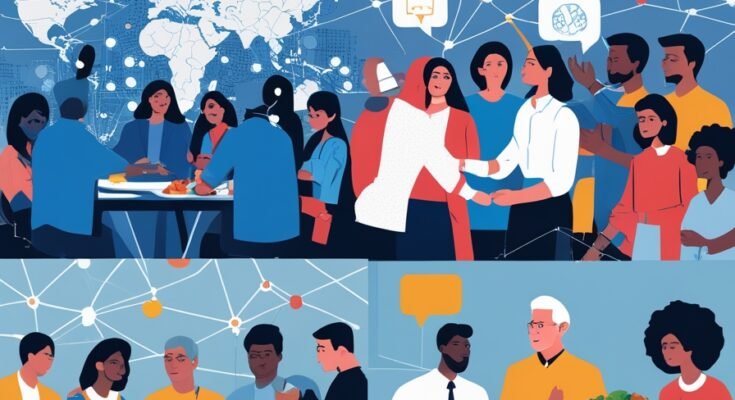Sociology: Exploring the Fabric of Human Society
Sociology is more than just an academic discipline—it’s a lens through which we decode the intricate web of human relationships, social structures, and cultural dynamics. By blending theory with real-world insights, this field helps us understand how societies form, evolve, and adapt across time and space. From family dynamics to global trends, sociology offers tools to improve lives and foster stronger communities. Let’s dive into its core principles, history, and impact on our world today.
What Is Sociology?
Sociology is the scientific study of society, focusing on three key pillars:
- Social Relationships: How do individuals and groups interact? What drives cooperation, conflict, or cultural exchange?
- Social Structures: Institutions like families, schools, and governments shape our identities and roles. How do they function, and what happens when they change?
- Social Phenomena: From migration to social media trends, sociologists uncover the “why” behind collective behaviors using theories and data.
Imagine sociology as a map that guides us through the complexities of human life—one that reveals hidden patterns in the chaos of everyday interactions.
A Journey Through Time: The Evolution of Sociology
Early Foundations
Long before sociology became a formal field, philosophers like Aristotle and Democritus pondered questions of justice, ethics, and human nature. These ideas laid the groundwork for what would later become a science of society.
The Birth of a Discipline
The 19th century marked sociology’s emergence as a distinct field. Auguste Comte, often called its founder, championed the study of social order and progress. Meanwhile, giants like Karl Marx and Max Weber dissected class struggles, capitalism, and the role of religion in shaping societies.
Theoretical Milestones
- Functionalism: Thinkers like Émile Durkheim explored how institutions (e.g., education, religion) maintain societal stability.
- Conflict Theory: Marx’s legacy lives on in analyses of power imbalances and economic inequality.
- Symbolic Interactionism: This lens, advanced by George Herbert Mead, examines how symbols, language, and daily interactions construct our shared reality.
Branches of Sociology: From Family to Globalization
Sociology’s scope is vast, with specialized branches tackling diverse aspects of life:
- Family Sociology: How do shifting gender roles or economic pressures reshape households?
- Education Sociology: Why do access gaps persist, and how do schools reinforce—or challenge—social hierarchies?
- Work and Industry: Explore the gig economy’s rise, automation’s impact, and worker-employer dynamics.
- Religion and Culture: How do beliefs bind communities, and what happens when traditions clash with modernity?
Each branch acts as a puzzle piece, contributing to a fuller picture of human society.
How Sociologists Work: Methods Behind the Insights
Sociologists employ both numbers and narratives to uncover truths:
- Quantitative Research: Surveys and statistics reveal broad trends, like voting patterns or health disparities.
- Qualitative Research: Interviews, fieldwork, and media analysis capture personal stories and cultural nuances.
Picture a researcher observing a bustling city square or analyzing social media data—each method bridges the gap between individual experiences and societal forces.
Sociology in Action: Real-World Impact
- Policy and Justice: Governments use sociological data to combat poverty, discrimination, and crime.
- Business and Marketing: Ever wondered how brands predict trends? Sociological insights decode consumer behavior.
- Health and Education: By identifying social determinants (e.g., income, race), experts design fairer healthcare and education systems.
- Media and Culture: From viral memes to TV shows, sociology explains how media shapes—and reflects—our values.
Did you know? Netflix’s global success relies partly on understanding cultural preferences—a testament to sociology’s practical power.
Challenges and Future Frontiers
Modern Hurdles
- Digital Revolution: Social media redefines relationships, blending virtual and real-world identities.
- Global Inequality: Wealth gaps, climate migration, and political unrest demand innovative solutions.
- Cultural Shifts: As traditions evolve, societies grapple with balancing heritage and progress.
Tomorrow’s Opportunities
- Tech-Driven Research: Big data and AI will uncover hidden social patterns.
- Interdisciplinary Collaboration: Partnering with psychology, economics, and environmental science can tackle complex issues like climate change.
- Policy Innovation: Sociologists will play a key role in crafting adaptive, inclusive laws.
Conclusion: Why Sociology Matters
Sociology isn’t confined to textbooks—it’s a living, breathing tool for building better communities. By unraveling the threads of culture, power, and human connection, this field equips us to address today’s challenges and envision a fairer future. In a world reshaped by TikTok revolutions, remote work, and climate crises, sociology remains essential for fostering empathy, equity, and resilience.



